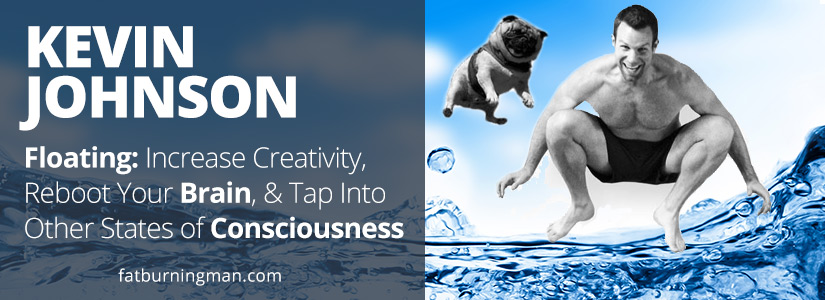Luxurious Escape
Peaceful Space
Floatation therapy is a luxurious escape from the constant stress of life’s daily pressures and a natural way to heal the body and mind. The concept is similar to the mineral salt baths at the Dead Sea in Israel. Eight hundred pounds of Epsom salt is dissolved into the spa tub of skin temperature water to create this effect. Both lightproof and soundproof, this peaceful space frees you of gravity, noise, and other distractions. As if in deep meditation, your body and mind achieve calmness, entering into a theta brain wave state resulting in a profound state of relaxation. When combined with the zero-gravity environment, the floatation allows your body and mind to enter into its deepest state of relaxation – not found anywhere else on earth.

Doctors, athletes, and float enthusiasts are using Floatation Therapy for neurological, circulatory, respiratory, digestive, muscular, skeletal, and hormonal balance. Floatation brings the body back into homeostasis.
- Aching Joints
- Addictions (drugs, alcohol, tobacco or food)
- Anxiety
- Arthritis and Fibromyalgia
- Asthma and Allergies
- Back and neck pain
- Cardiovascular conditions
- Chronic pain
- Circulation
- Complete Relaxation
- Concentration, motivation and memory loss
- Depression and neurosis
- Detoxification
- Headaches/migraines
- High blood pressure
- Gastric ulcers Insomnia
- Irritable bowl syndrome
- Jet lag, insomnia and exhaustion
- Multiple Sclerosis, fibromyalgia and
- Muscle Recovery
- Panic attacks
- Pre-natal Pre-menstrual tension
- Post-natal depression
- Rheumatic conditions
- Skin conditions – psoriasis/eczema
- Speeds recovery from illness
In addition to these many benefits, your learning abilities are at their greatest and your powers of visualization and creativity are substantially enhanced during floatation therapy. It has been said that you can learn a language in half the time while floating.
- One hour session is equal to 4 hours of restorative sleep
- Reduces cortisol levels back to a productive and normal state
- Environment where the “training of the mind” becomes effortless
- Speeds recovery time after any type of injury and improves ability to bounce back
- Takes you to and keeps you in the “theta state” which allows the most creative part of our brain to engage
- Balance a stressed out immune system through floating on a regular basis
- Epsom salt is a great muscle relaxer and anti-inflammatory mineral, that also aids in the detoxification of the body
Why every Athlete should jump into a Float Tank
Posted by: Anna Kolomycki
Floating or flotation is therapy in which the person lies in a dense Epsom salt water solution in a tank (pod/room) that has been specially-designed for this. It is an incredible and highly-effective way of relaxing and relieving stress. This is a very widely-accepted therapy and is used by a number of world-renowned athletes to treat various sports-related conditions and aid in their recovery. It is also beneficial for those who don’t play any sports but want to better manage the stresses in their system.
Cumulative Effects
What is notable is the fact that the positive effects of floatation are also cumulative – the more frequently you use this therapy, the more you benefit. After several floats our clients frequently comment how they crave time in the float tank, it becomes very addictive. Sports-people from various fields, use this experience to optimise the effects of their training routines, manage fatigue and speed-up their recovery from sports injuries.
Which Athletes use Floatation Therapy?
Whilst floatation has been around for quite some time, it is more known in some sports than others. Commonly we see floatation being widely used within the following sports:
- Golf
- Long distance runners
- Yogis
- Cross fit athletes
- MMA fighters
- Pregnant women (yes if you are carrying a baby you should be considered an athlete!)
This list is not exclusive and with a growing momentum, jumping in now before it takes over your sport will give you the edge!
The Benefits of using a float tank in sport
As a matter of fact the AIS (Australian Institute of Sport) sees flotation tank use as integral to the training regimes that their athletes’ follow. The different benefits of using flotation therapy are:
- Accelerates the recovery from injury
- Increases energy (ATP)
- Ideal space for visualization
- Boosts the immune system
- Reduces Lactic acid levels in the body
- Aids in facilitated rest, improving athletes exposure to fatigue.
In the floatation tank, gravity isn’t a factor. The complete relaxation that it provides, gives all the muscles the much-needed break they need. The benefits are truly impressive. When the person is in the tank, every single muscle in the body gets the rest it needs and the time to recover. Though you may feel that lying in bed or a sofa has the exact same effect, the fact is that gravity is always at work and this adds stress to many parts of the body.
Furthermore epsom salts are a magnesium and sulphate – a muscle relaxant and a protein builder for your joints. Not only can you truly decompress in the float tank, you absorb the minerals whilst you float directly into your muscles, allowing you to be noticeably less tense as soon as you get up!
Recovery Time Frame
When the athlete is in the flotation tank, the actual rate of recovery post physical exercise is enhanced beyond recognition. Recovery that would generally take a very long time gets compressed into just a few hours. Since floating in the water that has high concentrations of Epsom salt reduces the stresses of gravity, the weight and pressure is taken off strained muscles, joints and bones. This increases the efficiency of the blood circulation right through the body. It also significantly improves the recovery time after injury.
The body has amazing pathways set up, to alarm it of pain or injury, hot or cold etc when the brain receives these signals, it can then react and adapt accordingly. However this mechanism is not just designed to cope with injury. All positive signals of relief experienced whilst floating also go into the brain, producing a very profound, complete state of relaxation that is not to be dismissed.
Sports Performance Improvement
Athletes that use this float therapy in combination with visualisation techniques experience a very significant improvement in their performances. As the person’s brain transitions into a theta state, it becomes much more open to suggestion. The CNS (central nervous system) can essentially be effectively trained to produce ‘perfect performance’. Today a number of top athletes across Australia and the U.S use this technique to relax and up their performance in their chosen sport.
Working Against Gravity
While floating, gravity pressures gets taken-off the muscles and joints & the entire body is put in to a state of high physical relaxation. The blood pressure & oxygen intake reduces but the blood flow and distribution of red blood cells increases. These combined effects are especially beneficial to athletes, as it speeds the recovery from injury & assists in flushing-out cortisol, lactate & adrenaline that might have built-up either via training or performance.
Reduces Injury Risk
Floatation loosens the muscles & gives athletes a higher degree of control in their nervous systems. In effect, this reduces injury risk during training/competition. Floatation accelerates the athlete’s recovery process and releases large quantities of endorphins (natural painkiller of the body)
By being in an environment that facilitates sensory isolation, which is another component of floatation, the athlete truly has the space to reach the level of concentration required to have a tangible effect on his/her performance. Many modern training methods are focused on helping athletes master their “inner game” and assist in developing perfect synchronicity between body, mind and emotion and where better to find yourself then in a setting that is designed to help you lose yourself?
Floatation is also used by many people in helping them identify areas of tension that they were not previously aware of. Many people report being able to have a sense of a certain body part, “out of their body” whilst floating, drawing attention to an area that they can then go to their practitioner of choice for diagnosis and treatment.

When are you going to float?
So you can improve recovery, you can manage pre-injury, you can reduce muscle tension and you can out perform competitors by harnessing the under-utilised power of relaxation in sport. When are you going to float?